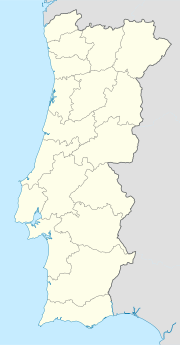Póvoa de Santa Iria is a city and former civil parish in the municipality of Vila Franca de Xira, Portugal. Since 2013, it is part of the civil parish Póvoa de Santa Iria e Forte da Casa. Its population in 2011 was 29,348.[1]
Póvoa de Santa Iria | |
|---|---|
 View of Póvoa de Santa Iria from the riverside area | |
| Coordinates: 38°51′43″N 9°04′08″W / 38.862°N 9.069°W | |
| Country | |
| Region | Lisbon |
| District | Lisbon |
| Municipality | Vila Franca de Xira |
| Disbanded | 2013 |
| Population (2011) | |
• Total | 29,348 |
| Time zone | UTC+00:00 (WET) |
| • Summer (DST) | UTC+01:00 (WEST) |
History
editIn 1336, the land where present-day Póvoa de Santa Iria is located was designated part of the Póvoa Majorat (Morgado da Póvoa) by Vicente Afonso Valente, for the benefit of his brother Lourenço Afonso Valente. For more than three centuries, the place was called Póvoa de São Martinho.[2]
After the extinction of the majorats in Portugal in 1863, the settlement obtained its current name, Póvoa de Santa Iria. The settlement had a strong connection with the Tagus river and its population had fishing, salt extraction and river transport as their main activities.[2]
In 1916 the civil parish (freguesia) of Póvoa de Santa Iria was created, as part of the Loures municipality. In 1926, the civil parish was detached from the Loures municipality and integrated in the Vila Franca de Xira municipality.[2] In the second half of the 20th century, a sharp population increase occurred in Póvoa de Santa Iria and the settlement was mainly converted into a commuter town. Following its expansion, Póvoa de Santa Iria was formally designated a town (vila) in 1985 and a city (cidade) in 1999.[2] After a major territorial administration reorganization in Portugal in 2013, the civil parish of Póvoa de Santa Iria was merged with the neighboring civil parish of Forte da Casa.[3]
In November 2014, Póvoa de Santa Iria was one of the locations most affected by a legionellosis outbreak in the Vila Franca de Xira municipality.[4]
Transportation
editPóvoa de Santa Iria is served by the Póvoa train station, which is part of the North Line and an important point of connection with the city of Lisbon. This station was the site of a tragic train accident on 5 May 1986, which claimed the lives of 17 people, making it one of the deadliest train disasters in Portugal's history.[5]
The city is also served by multiple bus lines from Carris Metropolitana, connecting with other points in the municipalities of Vila Franca de Xira, Loures and Lisbon.
Sports
editPóvoa de Santa Iria's football club is União Atlético Povoense, which competes in the First Division of the Lisbon Football Association.[6]
References
edit- ^ "Statistics Portugal - Web Portal". www.ine.pt. Retrieved 2021-03-11.
- ^ a b c d "Póvoa de Santa Iria". Junta de Freguesia da Póvoa de Santa Iria e Forte da Casa (in European Portuguese). Retrieved 2021-03-13.
- ^ "União das freguesias da Póvoa de Santa Iria e o Forte da Casa". Junta de Freguesia da Póvoa de Santa Iria e Forte da Casa (in European Portuguese). Retrieved 2021-03-13.
- ^ "Quatro anos depois do surto, processo da 'legionella' sem data para a instrução". www.dn.pt (in Portuguese). Retrieved 2021-03-13.
- ^ "'Human error' blamed for Portuguese train crash - UPI Archives". UPI. Retrieved 2023-03-28.
- ^ "At. Povoense - Playmakerstats". Playmakerstats. Retrieved 17 October 2021.
External links
edit- Junta de Freguesia Póvoa de Santa Iria e Forte da Casa (in Portuguese)
